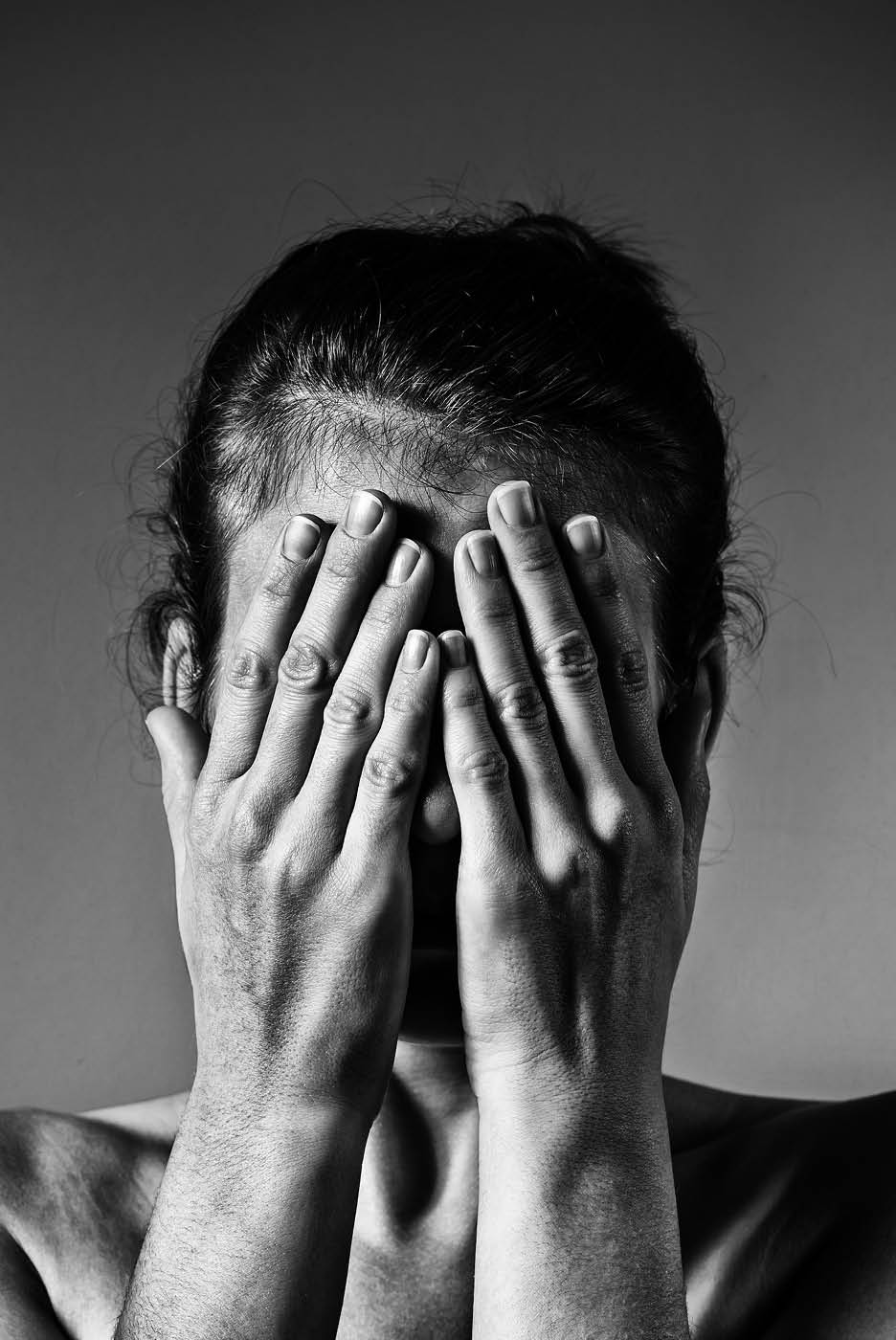In a Sydney cafe three women sit in close conversation. Two of them lean forward, their forearms on the table, looking intently at a woman who looks to be in her late forties. ‘He beat me, he beat me until I had bruises everywhere,’ she says, in a Russian accent. ‘And he put her in a cage!’ The ‘her’ is their daughter; after the marriage was over, she explains, her ex took their young daughter to the zoo and photographed her inside an animal enclosure. ‘She came home with three bruises, here, here and here.’
‘This is terrible,’ says one friend. The woman shakes her head. ‘That is nothing. You know nothing,’ she replies, direct but not unkind. ‘You’ve got pain after pain after pain, you know, but …’ The woman pauses, and the table falls quiet. ‘Then his new wife – she took everything,’ she says. ‘Good on her, good on her,’ the friends chorus.
Another cafe, this time in Kings Cross. As I write, a young woman nervously leans across and asks if I’m connecting to her computer by Bluetooth. When she sees my confusion, she apologises. She’s paranoid about being hacked because she’s being stalked by her ex-boyfriend, who’s a cop. She had to move interstate to get away from him, but she’s terrified he’ll use his connections to find out where she is.
I go to court with a friend who needs protection from her partner; he held her and their young kids hostage for hours one night, taunting her and demanding she become his slave. She is later devastated to discover that the father of her beautiful children has been violent with other women.
Another old friend flees her family home with her mother after being attacked by her father and stays in hiding with us for a week. Turns out her father has a gun, and he blames her for making his wife leave him. We make sure the doors are locked at night.
I used to think I didn’t know anyone who’d been through domestic abuse. Now I know that was never true. Now, I see its traces all around me.
***
The women who are degraded and dominated in this country occupy a deep underground. They walk on isolated paths – on the street, at the office, in the school playground and the shopping centre – unseen and alone. They are us – our sisters and mothers and friends and colleagues – and they are the women we’ll never meet, whose lives we cannot imagine.
Statistically, we all know at least one woman who’s lived in this underground, because it has been home to a shocking number of Australian women. According to Australia’s National Research Organisation for Women’s Safety (ANROWS), almost 2.2 million women alive today* have, at some point, lived underground. Some will never leave.
We think of domestic abuse as something that happens ‘behind closed doors’. But it’s actually happening all around us – we just don’t know what it looks like. Louisa, a 45-year-old with three children under ten, had her abuse paraded in front of strangers regularly at the supermarket. On the weekend, her partner would tell her where she could shop, and then tell her to wait there while he watched his nephews play football. Louisa would do the shopping, then wait in the supermarket with a trolley full of items.
When he arrived, he’d start going through them one by one, pulling out everything she wasn’t ‘allowed’ to have, like baby wipes. ‘He’d say “What do we need this for?” in front of people, and I’d be so embarrassed, humiliated – in fear all the time,’ she says. ‘I was so frightened, because his behaviour was so erratic and controlling. You want to run but you don’t know where to go, and you are thinking, this is just completely ridiculous. Like, it’s not normal, is it? Is it normal?’
They are us – our sisters and mothers and friends and colleagues – and they are the women we’ll never meet, whose lives we cannot imagine
Sometimes the most brutal acts of domestic abuse happen right in front of us. Detective Superintendent Rod Jouning, a former head of Victoria Police’s family and sexual violence unit, told me about a particularly shocking assault at a football game in rural Victoria. A man who was there with his wife and child had spent the day watching the footy with his mates. When it started getting late, his wife walked over to let him know it was time for them to go home, so they could get their kid ready for bed.
‘He turned around, said, “Don’t you dare disrespect me in front of my mates”, and then laid into her,’ said Jouning. ‘He broke her eye socket, fractured her jaw, then picked her up by the hair and one leg and dragged her to the car. Not one person intervened.’
People do intervene, of course – often at enormous risk to themselves. One night in 2017, around midnight, off-duty police officer Stephanie Bochorsky was watching television in her pyjamas when she heard a ‘bloodcurdling’ cry coming from the property next door. When she ran outside, she found a woman in the driveway standing in a pink dressing gown, screaming. When Stephanie asked her if she was okay, the woman cried, ‘No, he’s setting my kids on fire!’
Stephanie told the woman to call the police and not let anyone else inside, and then rushed into the house. Inside, it was eerily quiet and reeking of petrol. Seeing an unusual glow coming from one of the rooms, she entered to find three-year-old ‘Mikayla’ standing in her cot, her head entirely engulfed in flames – not screaming, just moving her head with a ‘shocked look on her face’. Stephanie grabbed a blanket and threw it over the toddler’s head to extinguish the fire.
Suddenly, behind her stood the girl’s father, Edward John Herbert – a towering figure covered in tattoos, naked, eyes vacant, in a drug-induced psychosis – pouring petrol on his seven-year-old daughter, ‘Tahlia’. When he saw Stephanie, he said just one thing to her: ‘Why don’t you take your fucking clothes off.’ Stephanie reacted immediately. ‘Get the fuck away from her,’ she said, and with Mikayla in her arms, reached forward and grabbed Tahlia by the back of her pyjama collar, and ran out of the room. Unbeknown to Stephanie, Herbert was carrying a butcher’s knife and his six-year-old son was also in the house. Later, Herbert told a neighbour that he set his daughter on fire because she was ‘too fucking beautiful’.
‘Don’t worry,’ he added, ‘I wouldn’t have lit my boy up.’ Thanks to Stephanie and neighbour Daniel McMillan, who managed to fight Herbert off, all three children survived. Mikayla suffered burns to 13 per cent of her body. Herbert was sentenced to seventeen years in jail for two counts of attempted murder. His insanity defence was rejected by the court.
I don’t share these stories to be gratuitous or shocking. I share them because they illustrate everyday horrors. The #MeToo movement jolted us out of our stupor by showing us what sexual harassment looks and feels like. If we’re to get that same visceral sense for domestic abuse, we need to doubly steel ourselves.
***
What is wrong with all these women? Why don’t they just leave? If anyone ever did that to me, I’d be out of there in a heartbeat. When most people hear stories of domestic abuse, this is their kneejerk response. We like to believe we would act immediately, that we would see what was coming. We think we’re better than the women who end up in abusive relationships. We think we’d be smarter, stronger, quicker to act. We would never get trapped. Not like them.
But think back to the times you forgave a lover for wronging you, or trusted them against your better judgement. To do that, you had to believe that the better part of them – the part you were in love with – was dominant, and their wrongdoing an aberration. Maybe you did break up with them, but got drawn back by their pleading and promises, or simply because you missed them. Maybe you were right to trust them; maybe you weren’t. It’s the same for victims of domestic abuse. The only difference is, their perspective isn’t just obscured by love and sexual attraction. It’s been scrambled by the forces of degradation and control.
We’re quick to judge women underground because we think their behaviour is irrational. It doesn’t make sense that a smart, independent woman would insist on staying with a man who brutalises her. It doesn’t make sense that after she leaves, there’s a good chance she will go back to him. It doesn’t make sense that a woman who is raped by her partner can continue to crave his affection. It doesn’t make sense that a mother would stay with an abusive father and put her children in danger.
Think back to the times you forgave a lover for wronging you, or trusted them against your better judgement
Maybe this does make sense to you. Maybe you scoff at those who ask why women don’t just leave, and remind them: ‘Don’t you know that leaving is the most dangerous time for a woman?’ But if we’re being honest, even the most empathic among us (myself included) can sometimes find the behaviour of victims bewildering (and deeply frustrating, if they are dear to us). Even women who’ve lived underground can find themselves making snap judgements about other victims.
Survivor Kay Schubach was at her abuser’s trial when one of his victims was testifying. ‘I was sitting there and I was thinking, this stupid girl, how did she let this happen? You know, like, oh God and then she got pregnant to him twice, and she went back to the house and kept going back, and this went on for months … How could she have been so stupid? And then this penny drops. It was exactly my story, word for word.’ Kay had fallen pregnant to the same man, and she too had forgiven him after savage assaults. ‘[He told her] she was ugly, old, stupid, past her use-by date, that he was building a case against her, trying to discredit her mental health … [trying to line up] witnesses to testify to any scratches or marks on him … It was exactly the same.’
Despite having made the same choices, Kay’s impulse was to revert to the position we’ve all been culturally trained to take. For decades, victims of domestic abuse have been blamed by the public, maligned by the justice system and pathologised by psychiatrists. Now, when most of us look at a violent relationship, we see just one logical binary: if your partner abuses you, you should leave. If you don’t leave, there’s obviously something wrong with you. That’s just ‘common sense’, right?
***
We don’t hear much about women’s resistance, but every day women push and fight back, even in the face of terrifying consequences. ‘I argued back,’ says survivor Nicole Lee. ‘You get to a point where you’re so exhausted, you’ve walked on eggshells so much – then he leaves a plate on the table, and you’re just like, “Can you just put that in the fucking sink?” And then you think why did I do that?, as the plate comes hurtling at you. You’re fighting back tooth and nail, get away from me, stop. But the physical power imbalance – there’s no chance of me protecting myself against this man, none whatsoever. I tried.’ Even when women feel that they’ve surrendered their agency, they are still making the minute-to-minute calculations required to survive. As one survivor described it: ‘Before I met my husband, I was never a strategic person. He has taught me strategy. It was about survival.’
***
Before a woman starts to weigh up whether to leave or stay, she must first recognise that she is a victim of domestic abuse. This may sound strange to some readers: how could someone not know they are being abused? But it can take victims months or years to realise that their partner’s ‘difficult’ behaviour is actually domestic abuse.
It’s not that they don’t know they’re being badly treated – they just don’t see it as ‘abuse’. In her TED talk, Leslie Morgan Steiner explains why she stayed for years in an abusive relationship with Conor. ‘Even though he held those loaded guns to my head, pushed me down stairs, threatened to kill our dog, pulled the key out of the car ignition as I drove down the highway, poured coffee grinds on my head as I dressed for a job interview, I never once thought of myself as a battered wife. Instead, I was a very strong woman in love with a deeply troubled man, and I was the only per- son on earth who could help Conor face his demons.’
This disconnect is vital to understand. Before women realise they’re a victim of domestic abuse, they see themselves as just another woman in a difficult relationship – albeit one that’s more difficult than most. Often, it’s a relationship they’ve invested a lot of time in, with someone they think they know better than anyone else. Most don’t want to give that up until they are sure there is no way to save it. This is what makes domestic abuse the most insidious and dangerous version of coercive control. People taken hostage against their will generally can’t wait to be released, so they can go back to their old life. In domestic abuse, the relationship in which they are captive is their life, and they will go to great lengths – and ignore severe pain and distress – to preserve it.
***
No matter how clearly we depict what domestic abuse is like for women living underground, most people will resist understanding it. This resistance is deep and instinctive: we don’t want to know that the same forces that so blissfully draw us together can also become our single greatest threat. We need to believe in love, and we need to believe that any threat to our wellbeing would come from someone unknown to us. We persist with the question ‘Why doesn’t she just leave?’ because it’s easier to separate ‘us’ from ‘them’ if we can frame ‘them’ as illogical. It is too frightening to believe that this could happen to any of us.
As we’ve seen, however, it’s not so hard to understand the behaviour of victims. In the years I’ve spent writing this book, I’ve found that it’s the questions we don’t ask that are the most confounding: Why does he stay? Why do these men, who seem to have so much hatred for their partners, not only stay, but do everything they can to stop their partner from leaving? Why do they even do it in the first place? It’s not enough to say that perpetrators abuse because they want power and control. Why do they want that?
This is an edited extract from Jess Hill’s See What You Made Me Do, out now through Black Inc.













3 Comments